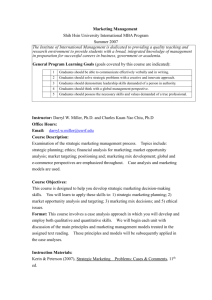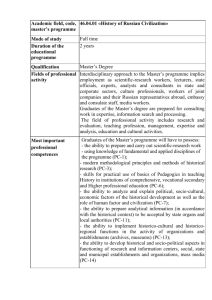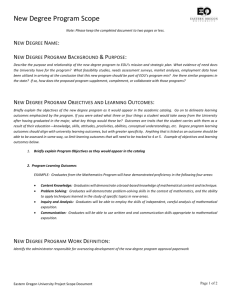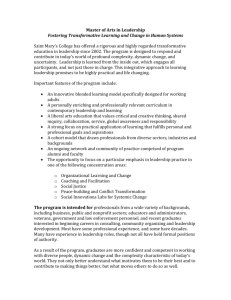Outcome-Goal Summary for Mechanical Engineering Courses
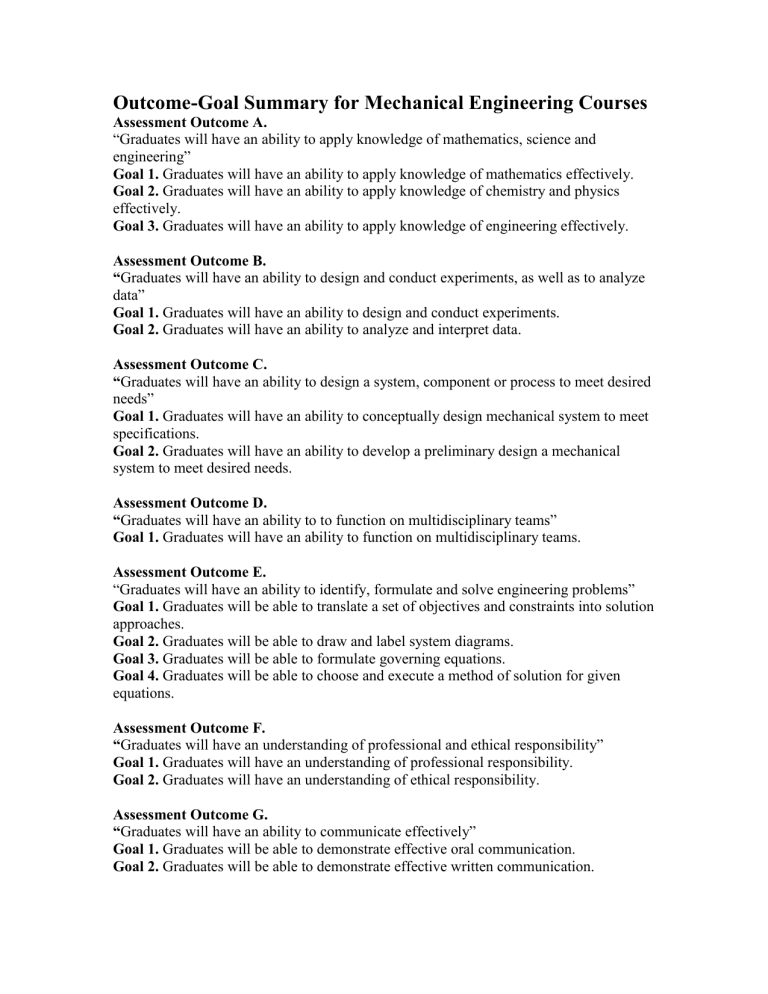
Outcome-Goal Summary for Mechanical Engineering Courses
Assessment Outcome A.
“Graduates will have an ability to apply knowledge of mathematics, science and engineering”
Goal 1. Graduates will have an ability to apply knowledge of mathematics effectively.
Goal 2. Graduates will have an ability to apply knowledge of chemistry and physics effectively.
Goal 3. Graduates will have an ability to apply knowledge of engineering effectively.
Assessment Outcome B.
“
Graduates will have an ability to design and conduct experiments, as well as to analyze data”
Goal 1. Graduates will have an ability to design and conduct experiments.
Goal 2. Graduates will have an ability to analyze and interpret data.
Assessment Outcome C.
“
Graduates will have an ability to design a system, component or process to meet desired needs”
Goal 1. Graduates will have an ability to conceptually design mechanical system to meet specifications.
Goal 2. Graduates will have an ability to develop a preliminary design a mechanical system to meet desired needs.
Assessment Outcome D.
“
Graduates will have an ability to to function on multidisciplinary teams”
Goal 1. Graduates will have an ability to function on multidisciplinary teams.
Assessment Outcome E.
“Graduates will have an ability to identify, formulate and solve engineering problems”
Goal 1. Graduates will be able to translate a set of objectives and constraints into solution approaches.
Goal 2. Graduates will be able to draw and label system diagrams.
Goal 3. Graduates will be able to formulate governing equations.
Goal 4. Graduates will be able to choose and execute a method of solution for given equations.
Assessment Outcome F.
“
Graduates will have an understanding of professional and ethical responsibility”
Goal 1. Graduates will have an understanding of professional responsibility.
Goal 2. Graduates will have an understanding of ethical responsibility.
Assessment Outcome G.
“ Graduates will have an ability to communicate effectively”
Goal 1. Graduates will be able to demonstrate effective oral communication.
Goal 2. Graduates will be able to demonstrate effective written communication.
Assessment Outcome H.
“
Graduates will have the broad education necessary to understand the impact of engineering solutions in a global and societal context”
Goal 1. Graduates will have a broad education in humanities and social sciences
Goal 2. Graduates will understand the impact of engineering solutions from a global perspective.
Assessment Outcome I.
“
Graduates will have a recognition of the need for, and an ability to engage in, life-long learning”
Goal 1. Graduates will recognize the need for continuing education, throughout their professional careers.
Goal 2. Graduates will recognize and be able to access available opportunities for continuing education, either through formal frameworks or through personal initiatives.
Assessment Outcome J.
“Graduates will have knowledge of contemporary issues”
Goal 1. Graduates will know and understand contemporary issues pertaining to the environment and society.
Goal 2. Graduates will know and comprehend the importance of cost factors in engineering design.
Goal 3. Graduates will understand and appreciate the importance of international standards and units.
Assessment Outcome K.
“
Graduates will have an ability to use the techniques, skills and modern engineering tools necessary for engineering practice”
Goal 1. Graduates will have the ability to use modern laboratory equipment for a broad range of typical engineering applications in the field of mechanical engineering including but not limited to advanced instrumentation, data acquisition and control systems.
Goal 2. Graduates will have the ability to utilize commercial software for engineering analysis, simulations, data management, computer aided design and manufacturing.
Assessment Outcome L.
“
Graduates will possess the ability to use modern microprocessors, microcontrollers, sensors and actuators in mechatronics systems designed to monitor and control products and processes”
Goal 1. Graduates will understand the roles microprocessors can play in modern products and processes.
Goal 2. Graduates will have experience in the connection of sensors and actuators to computers and microprocessors
Goal 3. Graduates will have experience in the design of computer algorithms to monitor and/or control electromechanical equipment or industrial processes.



